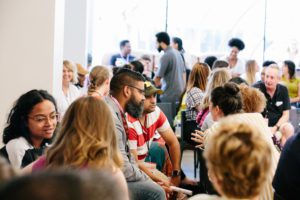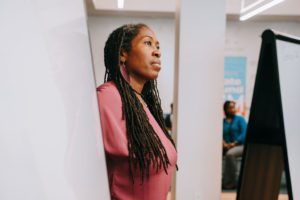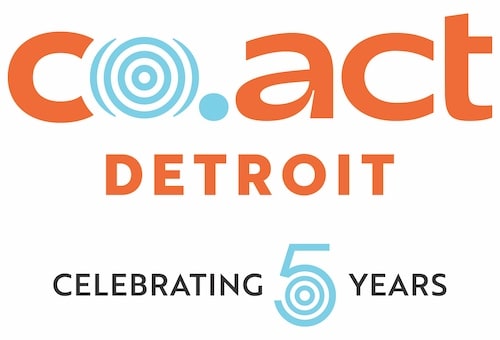More recently, NEW has worked alongside Co.act Detroit a key programming partner, including through the Nonprofit Startup Series, which was designed to help folks navigate the process of designing and launching nonprofit organizations.
 We sat with Will Jones III, Program and Communications Manager at NEW, who offered his reflections on NEW’s role in the nonprofit community of Southeast Michigan, supporting leaders of colors, and visions for a more balanced power dynamic between nonprofits and their funders.
We sat with Will Jones III, Program and Communications Manager at NEW, who offered his reflections on NEW’s role in the nonprofit community of Southeast Michigan, supporting leaders of colors, and visions for a more balanced power dynamic between nonprofits and their funders.
On the variety of offerings NEW provides — and its partnership with Co.act Detroit:
I think one of the things that folks kind of know us best for is organizational development consulting where we do strategic planning, board development, diversity, equity and inclusion work to make sure your organization are growing with the right people in leadership, and executive coaching for new directors and board members.
But we also provide financial services to organizations in the form of back office bookkeeping, fiscal sponsorship and financial consulting. We provide IT services in the form of help desk support and server hosting, and we also have a building in Ann Arbor that has conference rooms available for nonprofits in the area who are looking to rent meeting space for maybe a retreat, a board meeting, or an off-site engagement. Though it’s not as pretty as Co.act, we provide office space to small organizations that are looking to move to the next level.

The most exciting thing about Co.act is just the fact that we have a space where organizations can come and get connected to one another. And that can happen in a spontaneous way. It can happen in an organized way. But having the environment there that’s like,” this is what this is for” is really going to foster the connections that lead to better outcomes for our communities. We are excited to be hosting a number of workshops with Co.act, you know, and that’s exciting for us because even though we have a Detroit office, we’re predominantly in Washtenaw County. We’ve got plenty of Detroit clients, but we’d love to build our footprint here, and again, build our network of partners and resources.
On increasing leaders of color in the nonprofit community:
Champions for Change is our pilot attempt to address the racial equity gap in Washtenaw County, particularly around leadership. For example, there’s 2,300 nonprofits in Washtenaw County and fewer than 20 of them are run by people of color. That’s not even 1% — we’re talking about a sector that largely services marginalized communities, many of which are communities of color. So, when we look at why so many things haven’t changed for our communities over generations, this racial leadership gap is a blaring signal — the communities that we’re trying to help haven’t been reflected in the leadership of the organizations serving them, so things don’t move in the way that we expect, want, hope or need them to.
 Getting more people of color into leadership takes not only a recognition of who the leaders of color are in our communities who are out there already doing amazing work. It also takes institutions’ and organizations’ willingness to change their processes, practices and culture, so that when they find people of color, they keep them in their organizations. If we’re going to make like a systems-wide change, then we need people as individuals who want to step up and take those positions, but we also need the organizations, the people in these organizations, institutions to be willing to make changes as well. This program is at attempt to attend to both sides of that.
Getting more people of color into leadership takes not only a recognition of who the leaders of color are in our communities who are out there already doing amazing work. It also takes institutions’ and organizations’ willingness to change their processes, practices and culture, so that when they find people of color, they keep them in their organizations. If we’re going to make like a systems-wide change, then we need people as individuals who want to step up and take those positions, but we also need the organizations, the people in these organizations, institutions to be willing to make changes as well. This program is at attempt to attend to both sides of that.
On systems change and power dynamics in the grantee/funder relationship:
One of the biggest things we’re doing to make systems-level change in the sector is helping our funding and business partners understand that a broader approach to change is really needed right now. And doing that really just requires the leaders of our organizations that have the connections to those folks to be brave and courageous in speaking up and saying, “Hey, you all are coming from a great place, but unfortunately some of these models are actually hurting our organizations and communities because we’re actually kind of like perpetuating this system of charity and dependence rather than getting to the root causes that give folks agency and empowerment and take them out of the situations in which they rely on our services.”
 Those conversations are hard to have cause there’s a power dynamic, right? So, it’s really up to those of us who are positioned to be in front of those funders and that have a little bit of clout and sway to leverage that opportunity. And for NEW, being able to empathically communicate that to the funders is huge. NEW holds dual identities in this space; we both receive contributions and donations, and we’ve also served as fiscal sponsor to a number of small associations and organizations that are trying to decide whether or not they want to become for full on nonprofits. So we also get what it’s like to be a steward of other people’s money and say, “Okay, your program is supposed to do X, Y, and Z. That’s what you told us you were going to do. Now you’re kind of coming over here and doing this other thing. We need to help you get back on track.” We understand that responsibility, just like we understand the temptation to contort programming as a means to better aligning with the funding available as opposed to the community’s true needs. We’re privileged to be in both of these spaces, and are proud to serve as a trusted partner to all our colleagues in the sector as we make changes for the benefit of all of our communities.
Those conversations are hard to have cause there’s a power dynamic, right? So, it’s really up to those of us who are positioned to be in front of those funders and that have a little bit of clout and sway to leverage that opportunity. And for NEW, being able to empathically communicate that to the funders is huge. NEW holds dual identities in this space; we both receive contributions and donations, and we’ve also served as fiscal sponsor to a number of small associations and organizations that are trying to decide whether or not they want to become for full on nonprofits. So we also get what it’s like to be a steward of other people’s money and say, “Okay, your program is supposed to do X, Y, and Z. That’s what you told us you were going to do. Now you’re kind of coming over here and doing this other thing. We need to help you get back on track.” We understand that responsibility, just like we understand the temptation to contort programming as a means to better aligning with the funding available as opposed to the community’s true needs. We’re privileged to be in both of these spaces, and are proud to serve as a trusted partner to all our colleagues in the sector as we make changes for the benefit of all of our communities.
